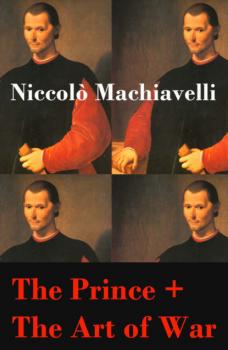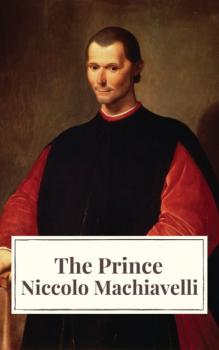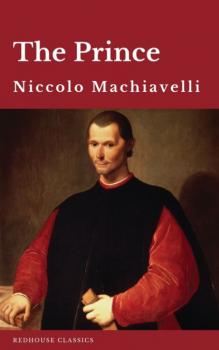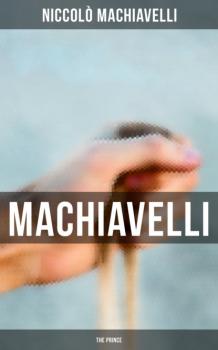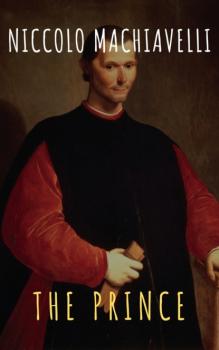ТОП просматриваемых книг сайта:
Niccolò Machiavelli
Список книг автора Niccolò MachiavelliАннотация
Contains Active Table of Contents (HTML) and in the end of book include a bonus link to the free audiobook.
"The Prince" is a political treatise by the Florentine public servant and political theorist Niccolò Machiavelli. Originally called De Principatibus (About Principalities), it was written in 1513, but not published until 1532, five years after Machiavelli's death. The treatise is not representative of the work published during his lifetime, but it is the most remembered, and the work responsible for bringing «Machiavellian» into wide usage as a pejorative term. It has also been suggested by some critics that the piece is, in fact, a satire.
"The Prince" is a political treatise by the Florentine public servant and political theorist Niccolò Machiavelli. Originally called De Principatibus (About Principalities), it was written in 1513, but not published until 1532, five years after Machiavelli's death. The treatise is not representative of the work published during his lifetime, but it is the most remembered, and the work responsible for bringing «Machiavellian» into wide usage as a pejorative term. It has also been suggested by some critics that the piece is, in fact, a satire.
Аннотация
"Ruhtinas" – Niccolò Machiavelli (käännös O. A. Kallio). Julkaisija – Good Press. Good Press on moneen tyylilajiin keskittynyt laajamittainen julkaisija. Pyrimme julkaisemaan klassikoita ja kaunokirjallisuutta sekä vielä löytämättömiä timantteja. Tuotamme kirjat jotka palavat halusta tulla luetuksi. Good Press painokset ovat tarkasti editoitu ja formatoitu vastaamaan nykyajan lukijan tarpeita ottaen huomioon kaikki e-lukijat ja laitteet. Tavoitteemme on luoda lukijaystävällisiä e-kirjoja, saatavilla laadukkaassa digitaalisessa muodossa.
Аннотация
The Art of War – Niccolò Machiavelli – The Art of War (Italian: Dell'arte della guerra) is a treatise by the Italian Renaissance political philosopher and historian Niccolò Machiavelli. The format of The Art of War is a socratic dialogue. The purpose, declared by Lord Fabrizio Colonna (perhaps Machiavelli's persona) at the outset, «To honor and reward virtù, not to have contempt for poverty, to esteem the modes and orders of military discipline, to constrain citizens to love one another, to live without factions, to esteem less the private than the public good.» To these ends, Machiavelli notes in his preface, the military is like the roof of a palazzo protecting the contents. Written between 1519 and 1520 and published the following year, it was Machiavelli's only historical or political work printed during his lifetime, though he was appointed official historian of Florence in 1520 and entrusted with minor civil duties
Аннотация
This carefully crafted ebook: «The Prince + The Art of War (2 Unabridged Machiavellian Masterpieces)» is formatted for your eReader with a functional and detailed table of contents. This eBook presents 2 Political Masterpieces by Niccolò Machiavelli: The Prince & The Art of War. The Prince: Il Principe (The Prince) is a political treatise by the Florentine philosopher Niccolò Machiavelli, written c. 1513, published posthumously 1532. The Prince is sometimes claimed to be one of the first works of modern political philosophy, in which the effective truth is taken to be more important than any abstract ideal. It was also in direct conflict with the dominant Catholic and scholastic doctrines of the time concerning how to consider politics and ethics. Machiavelli dedicated The Prince to the ruling Medici of the time, leading some today to still speculate whether the book was a satire. Niccolò Machiavelli asserted that The Prince (president, dictator, prime minister, etc.) does not have to be concerned with ethics, as long as their motivation is to protect the state. It is this questionable belief that in many ways had lead to the modern world as we know it. His assertion was that the head of state must protect the state no matter the cost and no matter what rules he or she breaks in the process. The Art of War: written between 1519 and 1520 and published in 1521. It was the only historical or political work printed during Machiavelli's lifetime. Voltaire said, «Machiavelli taught Europe the art of war; it had long been practiced, without being known.» Machiavelli considered The Art of War his greatest achievement. This book teaches how to recruit, train, motivate, and discipline an army, shows the difference between strategy and tactics. Machiavelli does a masterful job of breaking down and analyzing historic battles.
Аннотация
Contains Active Table of Contents (HTML) and in the end of book include a bonus link to the free audiobook. The Prince is the most controversial book about winning power – and holding on to it – ever written. Machiavelli's tough-minded, pragmatic argument that sometimes it is necessary to abandon ethics to succeed made his name notorious. Yet his book has been read by strategists, politicians and business people ever since as the ultimate guide to realpolitik.
How can a leader be strong and decisive, yet still inspire loyalty in his followers? How do you keep your enemies in check? Is it better to be feared than loved? When is it necessary to break the rules? This shrewd handbook on how power really works answers all these questions by examining regimes and their rulers around the world and throughout history, from Roman emperors to renaissance Popes, from the savagely cruel Hannibal to the utterly devious Cesare di Borgia.
How can a leader be strong and decisive, yet still inspire loyalty in his followers? How do you keep your enemies in check? Is it better to be feared than loved? When is it necessary to break the rules? This shrewd handbook on how power really works answers all these questions by examining regimes and their rulers around the world and throughout history, from Roman emperors to renaissance Popes, from the savagely cruel Hannibal to the utterly devious Cesare di Borgia.
Аннотация
Contains Active Table of Contents (HTML) and in the end of book include a bonus link to the free audiobook. The Prince is the most controversial book about winning power – and holding on to it – ever written. Machiavelli's tough-minded, pragmatic argument that sometimes it is necessary to abandon ethics to succeed made his name notorious. Yet his book has been read by strategists, politicians and business people ever since as the ultimate guide to realpolitik.
How can a leader be strong and decisive, yet still inspire loyalty in his followers? How do you keep your enemies in check? Is it better to be feared than loved? When is it necessary to break the rules? This shrewd handbook on how power really works answers all these questions by examining regimes and their rulers around the world and throughout history, from Roman emperors to renaissance Popes, from the savagely cruel Hannibal to the utterly devious Cesare di Borgia.
How can a leader be strong and decisive, yet still inspire loyalty in his followers? How do you keep your enemies in check? Is it better to be feared than loved? When is it necessary to break the rules? This shrewd handbook on how power really works answers all these questions by examining regimes and their rulers around the world and throughout history, from Roman emperors to renaissance Popes, from the savagely cruel Hannibal to the utterly devious Cesare di Borgia.
Аннотация
Contains Active Table of Contents (HTML) and in the end of book include a bonus link to the free audiobook. The Prince is the most controversial book about winning power – and holding on to it – ever written. Machiavelli's tough-minded, pragmatic argument that sometimes it is necessary to abandon ethics to succeed made his name notorious. Yet his book has been read by strategists, politicians and business people ever since as the ultimate guide to realpolitik.
How can a leader be strong and decisive, yet still inspire loyalty in his followers? How do you keep your enemies in check? Is it better to be feared than loved? When is it necessary to break the rules? This shrewd handbook on how power really works answers all these questions by examining regimes and their rulers around the world and throughout history, from Roman emperors to renaissance Popes, from the savagely cruel Hannibal to the utterly devious Cesare di Borgia.
How can a leader be strong and decisive, yet still inspire loyalty in his followers? How do you keep your enemies in check? Is it better to be feared than loved? When is it necessary to break the rules? This shrewd handbook on how power really works answers all these questions by examining regimes and their rulers around the world and throughout history, from Roman emperors to renaissance Popes, from the savagely cruel Hannibal to the utterly devious Cesare di Borgia.
Аннотация
This eBook edition of «Machiavelli: The Prince» has been formatted to the highest digital standards and adjusted for readability on all devices. The Prince is a political treatise by the Florentine philosopher Niccolò Machiavelli, written c. 1513. The Prince is sometimes claimed to be one of the first works of modern political philosophy, in which the effective truth is taken to be more important than any abstract ideal. It was also in direct conflict with the dominant Catholic and scholastic doctrines of the time concerning how to consider politics and ethics. Machiavelli dedicated The Prince to the ruling Medici of the time, leading some today to still speculate whether the book was a satire. Niccolò Machiavelli asserted that The Prince (president, dictator, prime minister, etc.) does not have to be concerned with ethics, as long as their motivation is to protect the state. It is this questionable belief that in many ways had lead to the modern world as we know it. His assertion was that the head of state must protect the state no matter the cost and no matter what rules he or she breaks in the process.
Аннотация
Contains Active Table of Contents (HTML) and in the end of book include a bonus link to the free audiobook. The Prince is the most controversial book about winning power – and holding on to it – ever written. Machiavelli's tough-minded, pragmatic argument that sometimes it is necessary to abandon ethics to succeed made his name notorious. Yet his book has been read by strategists, politicians and business people ever since as the ultimate guide to realpolitik.
How can a leader be strong and decisive, yet still inspire loyalty in his followers? How do you keep your enemies in check? Is it better to be feared than loved? When is it necessary to break the rules? This shrewd handbook on how power really works answers all these questions by examining regimes and their rulers around the world and throughout history, from Roman emperors to renaissance Popes, from the savagely cruel Hannibal to the utterly devious Cesare di Borgia.
How can a leader be strong and decisive, yet still inspire loyalty in his followers? How do you keep your enemies in check? Is it better to be feared than loved? When is it necessary to break the rules? This shrewd handbook on how power really works answers all these questions by examining regimes and their rulers around the world and throughout history, from Roman emperors to renaissance Popes, from the savagely cruel Hannibal to the utterly devious Cesare di Borgia.




